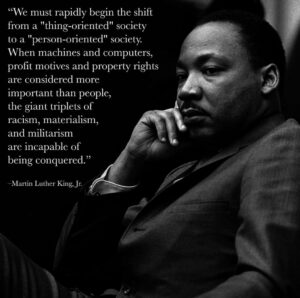 There’s a strong social justice element to the Zero Waste philosophy. Simply put, the zero waste concept is about using shared resources fairly, respecting others and taking personal responsibility for any waste that we generate –as individuals and as a community. Some excerpts and resources to consider:
There’s a strong social justice element to the Zero Waste philosophy. Simply put, the zero waste concept is about using shared resources fairly, respecting others and taking personal responsibility for any waste that we generate –as individuals and as a community. Some excerpts and resources to consider:
“We must rapidly begin the shift from a “thing-oriented” society to a “person-oriented” society. When machines and computers, profit motives and property rights are considered more important than people, the giant triplets of racism, materialism and militarism are incapable of being conquered.” –-Martin Luther King, Jr., “Racism, Extreme Materialism and Militarism”
Today’s throw-away societies create and dispose of vast quantities of waste every day. But not all are equally responsible for this problem. Those who already have more, waste more — and this pollution is too often dumped on communities that are treated as “disposable.” As pollution overwhelms many of our cities and natural resources become scarce, people around the world are increasingly realizing that this pattern must change. We cannot continue to throw “away.” Simply put, “away” does not exist. When we bury our waste, the landfills that we create hurt communities; they generate toxic leachates and emit methane gas which contributes to climate change. Burning garbage (otherwise known as “incineration”) is an equally primitive scheme that also destroys resources and is even more costly and polluting.
There is a much better approach.For generations now, workers and communities have conserved materials and created value through composting, recycling, and reuse.They have innovated solutions and demonstrated how to create locally resilient economies through strategies that generate livelihoods, rebuild the soil, protect public health, and recover materials for manufacturing. And today they are coming together with forward-thinking local governments to put forth a new vision of how we can live better in this world. ZeroWasteWorld.org
Zero Waste Promotes Peace The U.S. and every country around the world recognize limited natural resources as an issue of national and global security. As we run out of the natural resources that support us — like oil, minerals, and even fresh water — chances are we’ll end up fighting over the supplies we have left. At least 40% of global conflicts in the past 60 years had links to natural resources. What we buy, how it’s made, and how long we use it directly impact many of the people suffering from these conflicts around the world. When we choose Zero Waste, we choose a more peaceful future. –EcocycleSoluntionsHub.org
We’ve been talking a lot about the horrific impacts of plastic on the planet and on other species, but plastic hurts people too, especially poor people. And both in the production of plastic, the use of plastic and the disposal of plastic, the people who have the bull’s-eye on their foreheads are poor people. Van Jones: The Economic Injustice of Plastic TED Talk
Related: What Is Zero Waste? What is the Zero Waste School Initiative?
